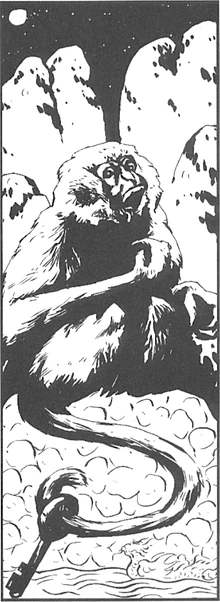In the common parlance of the Hsien, Nei Tan is "Internal Alchemy," Taoist magic Wu Tan practiced by the shinma pursuing the Tao Te Hsien.
Overview[]

As this Alchemy is based on the Tao Te Hsien, we first need to know what the Tao Te Hsien is not. It is not the Taoism of Lao Tsu, though it was inspired by it. Its point is for the shinma to understand his or her place in the cosmos since the coming of the Wall. Unlike the human philosophy, it has a goal... to give the hsien the power to break through the Wall and journey to the Spirit Worlds.
It shares many of the Tao's characteristics. Followers tend to retreat from the trappings of the world and see a life of contemplative ease in nature. They love learning for its own sake but care little for politics. Some are scientists, others priests, others beggars, others warriors. The hsien of Japan have modified it to a more Zen-like philosophy called Hsien-do and, unlike some mortal religions, the Tao Te Hsien welcomes change and individualism, as long is it doesn't become self aggrandizement. It is quiet, mysterious, and profound.
It has five steps which roughly correspond to the Taoist creation story, but in reverse. For the Taoists there was first Wu-Wo: Not Nothing. From Wu-Wo came Wu Chi: No Limit. this spawned Hu T'un: Chaos. In the center of this Chaos was a still point, a speck at first that became T'ai Chi: the Great Pole and from this grew Great Change: T'ai I which is divided into two stages: T'ai Chu: the Great First or form, and T'ai Shih: the Great Beginning or the First Breath (Chi). All these eventually led to the creation of the First Age: T'ai Su: the Great Primordial.
Why are the steps in reverse? The steps represent the struggle to return to No Limit; to break the bonds that limit the shinma's travel to the Spirit Worlds. There are many paths back to No Limit but the surest is the Tao Te Hsien. It is rumored that the Profane Gods have their own version of Nei Tan called Hac Tao or the Black Way; a way dictated by a Yama King during the Third Age.
System[]

Nei Tan uses the same basic system as the other Hsien Alchemies. There are Yin and Yang effects and therefore Yin and Yang chi still determine the difficulty of rolls. The difference is the dice pool. There are no Tao attributes so one cannot add a Nei Tan score to an attribute. The Dice pool equals the character's Tao Score which improves like Yin and Yang Chi... based on roleplay. It is limited to the average of the character's Yin and Yang scores rounded down. Nei Tan can only increase when a character's Chi Scores are balanced. Magic cannot be used to balance the scores. It must be done naturally.
Attributes[]
- Virtue - Balance
- Constructive Cohorts - None
- Adversary - Nei Tan is its own Adversary
- Yin Attribute - N/A, See above
- Yang Attribute - N/A, See above
Fortunes[]
The regular Fortunes of the Elemental Alchemies tend not to apply to Nei Tan. There is no Color or Season per se. It would seem that, though, as the Hsien becomes more in tune with him or herself and their place in the cosmos their own selves and their own fortunes would be helpful. Wani Form is still a Fortune. Listed fortunes for Nei Tan are
- Meditation
- Sites of Natural Beauty
- Dragon Nests
- Possessing Balanced Chi
- Fourth Moon, Eleventh Moon
It could also be possible that a Festival like New Year's Day in Japan, with its focus on what was and what will be and personal growth, could be a Fortune per storyteller decree.
Modifiers[]
Even though some effects of this Tan may seem to target others, it is important to say that this Alchemy springs from inside the shinma. All effects must be thought of as centering on the character and not others. A Hsien may not directly affect he world without channeling that power through themself. Most modifiers, therefore, are Continuance, Circumstance, and Magnitude. Abundance and Domain should be restricted. (For a more in-depth discussion on Modifiers see the page on Wu Tan.)
I Chih[]
T'ai Su: The Great Primordial[]
The first step of the Tao Te Hsien is the last step of creation where the forms of nature were settling into place.
- Shapechange - A Yang effect, Magnitude of Change governs most of the effects. Altering the face is minor with no extra successes needed. Changing Sex is basic; Face, sex and race is Significant' changing species is Major. While the characters gain some abilities of the new species, they are not skilled in the new form. Fish can breathe water but that doesn't mean the can swim well. Birds can fly but may not know how. Animal forms may have to learn new abilities. Those who want to change into larger creatures must use the appropriate alchemies to increase attributes. Continuance must be used to maintain the form. This is a Yang Effect.
- Visage of the Dead - This Yin effect lets the hsien effectively kill their bodies for a period of time. Summoning forth their Yin chi allows them to appear as a rotting corpse or mummified remains. The catch is they are actually dead for the duration of the effect with no recollection of the time or perceptions during it. Some have awakened buried or were devoured by animals before the spell wore off.
T'ai I: The Great Change[]
T'ai I marked the birth of reality as the elements formed around the Great Pole. This is the coalescing of Chi and the birth of time. The alchemist can manipulate how time affects them and gain some control of their chi. Some texts speak of a great ritual that can stop the ravages of time on the hotei. It is said to include drinking powdered Jade while traveling a Dragon Line.
- Axis of Time - The Hsien can decrease time's hold on them, speeding up their own movement through time to gain extra actions in combat. Every two successes gives an extra action. Continuance can prolong the effect. This is a Yin Effect.
- The Mutable Furies - The hsien can manipulate their Chi values. Points of Yin Chi can be moved to Yang Chi and vice versa. It is often used to temporarily balance chi values though some do the opposite. It is much more valuable to have lots of Yang chi in combat, for instance. A point of Chi can be moved per two successes. Continuance prolongs the effect.
T'ai Chi: The Great Pole[]
In the midst of the swirling of Hun T'un (Chaos) T'ai Chi was formed, the locus and anchor for reality. Some wise shinma in the Di Fu believe Earth formed the T'ai Chi or was at least the first element formed on it.
- The Typhoon's Eye - T'ai Chi grants the shinma the power to pass through storms unscathed. By using I Chih based on this power, the character can make himself harder to hit or target with an attack. The downside is that it hsien must mimic T'ai Chi. The can meditate, perform kata, draw, etc... They cannot attack or communicate with anyone. Their actions must be self absorbed or meaningless. This is always a yin effect and every 2 successes decreases an opponents Dice Pool by one.
Hu T'un: Chaos[]
The limitless possibilities of Wu Chi created Chaos: Hu T'un. This is a frightening time for the one seeking the Tao Te Hsien. They have almost made it back to the point of No Limit and the Jade Key but for the moment are on the edge of total discord. Botches of this I Chih should always involve limited insanity or bizarre personality quirks.
Shinma invoke Hu T'un to influence chance. Yang effects award luck. Yin effects ruin luck. These can be particular effects or awarded as Dice pool to be used or other rolls. I Chih created can be vague directed but never fully controlled and the storyteller is encouraged to be capricious: generous, humorous, or malicious as whim strikes. It is important that the effect never works as planned. If the roll succeeds the intent of the I Chih must be served, but not exactly the way the character desires.
- The Benevolent Hand of Jade - This I Chih makes the improbable probable... to the benefit of the caster. It is only used outside of combat and only effects a single action. Magnitude of Change comes into play. It is always a Yang effect. It is improbable that the tire on a car chasing the character will fail but this effect may cause it to fail.
- Backside of the Monkey King - This I Chih makes the probable improbable... to the benefit of the caster. It is only used outside of combat and only effects a single action. Magnitude of Change comes into play. It is always a Yin effect. Fleeing your enemy into a room, it is probable that the next person coming through the door is the pursuer. This effect could make it someone else.
Wu Chi: No Limit - The Jade Key[]
Just after Wu-wo (Not Nothing) came Wu Chi (No Limit), a time of unbounded potential. This state is only reached by those who are most pure in following the teachings of the Tao Te Hsien. This revelation, strangely enough, comes quietly and unexpectedly during a moment of peace. To most it arrives in a sandalwood box with fine, silk ribbons: a key about the length of the forearm made of the finest jade. This key cannot be stolen or harmed in any way. The meek tuck it into their clothes while some others wear it around their neck. Hanuman uses his to crack nuts and clout proud kamuii about the head and shoulders. The key has no real power and some say it is only a reminder of what has been regained. Its owner can once again travel to the Yin and Yang worlds freely. They can also raise or lower the Wall rating.
- Fortify the Wall - The wielder of the key can temporarily strengthen the Wall of a place by one for every two successes. This can only be attempted once a day and is a Yin effect.
- Unlock the Jade Portal - To unlock the Wall and travel beyond it, the shinma must make a Yang roll and generate more successes than the area's Wall rating.
References[]
- CTD. Land of Eight Million Dreams, pp. 14, 117-121.
|
Common: |
Chicanery · Legerdemain · Primal · Soothsay · Wayfare |
|
Rare: |
Aphrodesia · Autumn Way · Kryos · Metamorphosis · Pyretics · Skycraft · Spirit Link |
|
Kith: |
Chronos · Dream-Craft · Infusion · Naming · Sovereign · Tale Craft |
|
Forbidden: |
Burnout · Contempt · Delusion · Discord · Oneiromancy · Stultify · Webcraft |
|
Slivers: |
|
|
Wu Tan: |
|
|
Realms: |
Actor · Fae · Nature · Prop · Scene · Time · Inanimae Realms |
